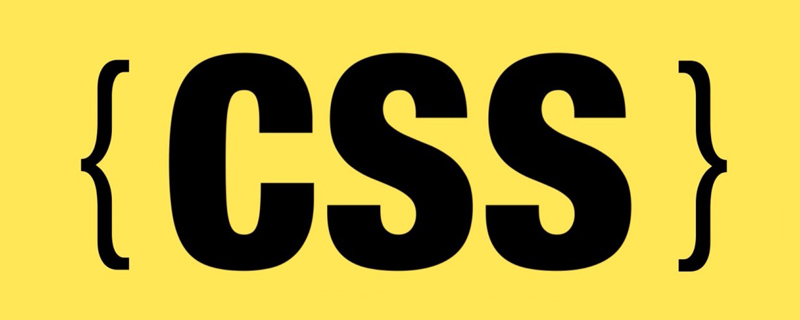Recently I have seen many tutorials on the Internet teaching you how to use CSS to draw graphics. Today I will summarize for you how to use CSS style sheets to draw triangles and parallelograms. Those who are interested can study it in depth.
The first method: use border
A rectangle to join two triangles to finally create a parallelogram. Why can triangles be generated using borders? Let’s take a look at a picture first:
After looking at the changing process of the three small figures in the picture, you should already understand half of it. In fact, hacking only requires two conditions to create a triangle. First, the length and width of the element itself are 0; second, the unnecessary parts are hidden through border-color. Through a similar method, you can also create trapezoids. The code for the three shapes in the above picture is as follows. (Attached is a CodePen example, http://codepen.io/jerryzou/pen/mJYJym)
#first {
width: 20px;
height: 20px;
border-width: 10px;
border-style: solid;
border-color: red green blue brown;
}
#second {
width: 0;
height: 0;
border-width: 10px;
border-style: solid;
border-color: red green blue brown;
}
#third {
width: 0;
height: 0;
border-width: 10px;
border-style: solid;
border-color: red transparent transparent transparent;
}The next step is to consider how to splice a parallelogram. In the border method, it consists of three parts, namely the left triangle, the rectangle, and the right triangle. It would be too cumbersome to create three elements every time a parallelogram is drawn, so the :before and :after pseudo-elements are a good choice here. Let's achieve this effect:

In order to seamlessly splice triangles and rectangles together, multiple attributes must be consistent, so use something like Less, Sass , Stylus and other CSS preprocessors will make this code easier to maintain. The Scss version of the code is given below. (Attached is the CodePen link, http://codepen.io/jerryzou/pen/ZGNGWZ?editors=110)
//三角形的宽高
$height: 24px;
$width: 12px;
//对平行四边形三部分的颜色进行赋值
@mixin parallelogram-color($color) {
background: $color;
&:before { border-color: transparent $color $color transparent; }
&:after { border-color: $color transparent transparent $color; }
}
//单个三角形的样式
@mixin triangle() {
content: '';
display: block;
width: 0;
height: 0;
position: absolute;
border-style: solid;
border-width: $height/2 $width/2;
top: 0;
}
//平行四边形的样式
.para {
display: inline-block;
position: relative;
padding: 0 10px;
height: $height;
line-height: $height;
margin-left: $width;
color: #fff;
&:after {
@include triangle();
right: -$width;
}
&:before {
@include triangle();
left: -$width;
}
@include parallelogram-color(red);
}It should be noted that if the slope of the triangle set by $height and $width is too small or If it is too large, it may cause jagged rendering, so you need to test the visual effects of different widths and heights when using it.
The second method: using transform
The method of using transform to realize parallelogram is what I saw when I was shopping, the effect is about It looks like this:

After seeing it, I thought it was so amazing. It turns out that it can only have the outer outline of a parallelogram. (Because method one can only create a parallelogram with a filling effect) It is very simple to implement, mainly with the help of transform: skew(...). Let’s take a look at the source code.
<style>
.city {
display: inline-block;
padding: 5px 20px;
border: 1px solid #44a5fc;
color: #333;
transform: skew(-20deg);
}
</style>
<div class="city">上海</div>So we got this effect:

You must think this when you see the picture:

Don’t worry, we have indeed distorted the entire div, causing the text in the middle to be slanted, and this is obviously not the effect we want. So we need to add an inner element and reversely distort the inner element to get the effect we want:

The implementation code is as follows, Attached is a CodePen example (http://codepen.io/jerryzou/pen/BNeNwV?editors=110)
<style>
.city {
display: inline-block;
padding: 5px 20px;
border: 1px solid #44a5fc;
color: #333;
transform: skew(-20deg);
}
.city div {
transform: skew(20deg);
}
</style>
<div class="city">
<div>上海</div>
</div>Summary
The first method uses the border attribute to hack out the triangle and pass Splicing three elements finally achieves a parallelogram; while the second method uses transform: skew to obtain a parallelogram. Overall, the second method is much smaller than the first method and is easy to understand. The only drawback is that it cannot construct trapezoids like those used in the pagination of this site.
I hope this article will be helpful to everyone. In fact, the same principle applies. Squares, rectangles and some equilateral figures can also be made using this method.
Recommended reading:
The above is the detailed content of How to draw triangles and parallelograms with CSS. For more information, please follow other related articles on the PHP Chinese website!
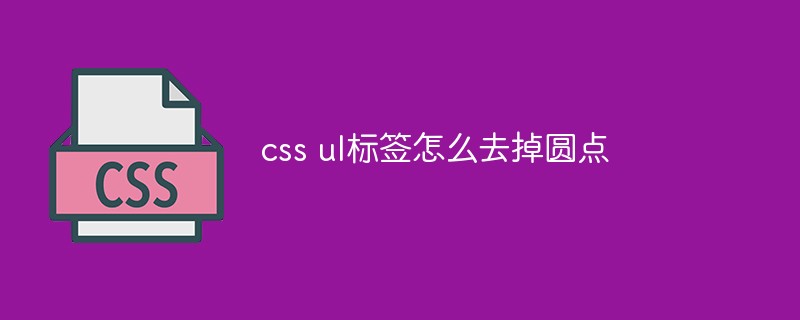 css ul标签怎么去掉圆点Apr 25, 2022 pm 05:55 PM
css ul标签怎么去掉圆点Apr 25, 2022 pm 05:55 PM在css中,可用list-style-type属性来去掉ul的圆点标记,语法为“ul{list-style-type:none}”;list-style-type属性可设置列表项标记的类型,当值为“none”可不定义标记,也可去除已有标记。
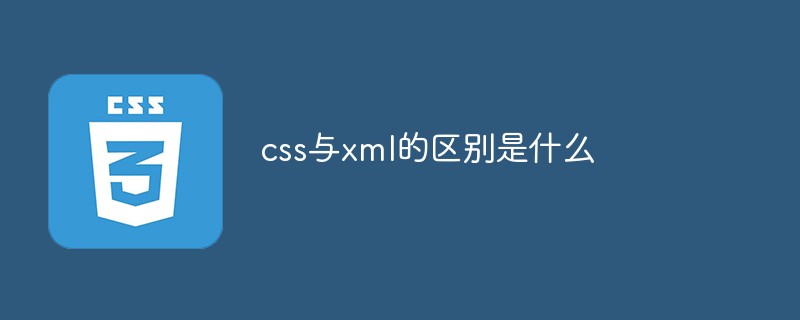 css与xml的区别是什么Apr 24, 2022 am 11:21 AM
css与xml的区别是什么Apr 24, 2022 am 11:21 AM区别是:css是层叠样式表单,是将样式信息与网页内容分离的一种标记语言,主要用来设计网页的样式,还可以对网页各元素进行格式化;xml是可扩展标记语言,是一种数据存储语言,用于使用简单的标记描述数据,将文档分成许多部件并对这些部件加以标识。
 css3怎么实现鼠标隐藏效果Apr 27, 2022 pm 05:20 PM
css3怎么实现鼠标隐藏效果Apr 27, 2022 pm 05:20 PM在css中,可以利用cursor属性实现鼠标隐藏效果,该属性用于定义鼠标指针放在一个元素边界范围内时所用的光标形状,当属性值设置为none时,就可以实现鼠标隐藏效果,语法为“元素{cursor:none}”。
 rtl在css是什么意思Apr 24, 2022 am 11:07 AM
rtl在css是什么意思Apr 24, 2022 am 11:07 AM在css中,rtl是“right-to-left”的缩写,是从右往左的意思,指的是内联内容从右往左依次排布,是direction属性的一个属性值;该属性规定了文本的方向和书写方向,语法为“元素{direction:rtl}”。
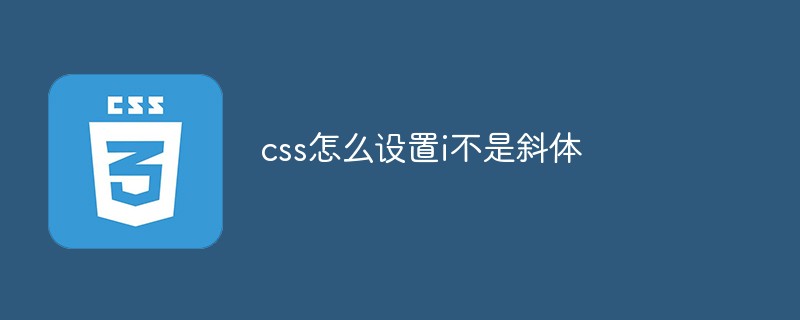 css怎么设置i不是斜体Apr 20, 2022 am 10:36 AM
css怎么设置i不是斜体Apr 20, 2022 am 10:36 AM在css中,可以利用“font-style”属性设置i元素不是斜体样式,该属性用于指定文本的字体样式,当属性值设置为“normal”时,会显示元素的标准字体样式,语法为“i元素{font-style:normal}”。
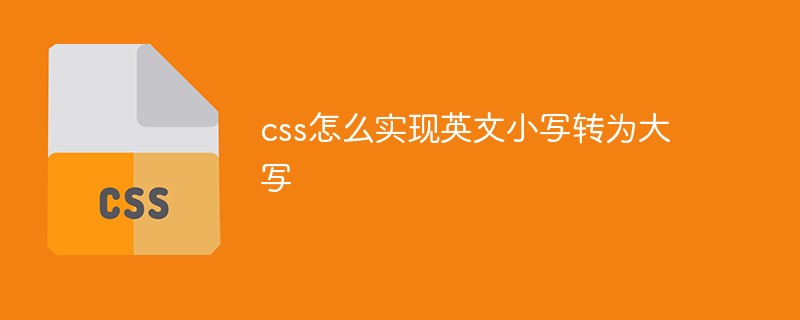 css怎么实现英文小写转为大写Apr 25, 2022 pm 06:35 PM
css怎么实现英文小写转为大写Apr 25, 2022 pm 06:35 PM转换方法:1、给英文元素添加“text-transform: uppercase;”样式,可将所有的英文字母都变成大写;2、给英文元素添加“text-transform:capitalize;”样式,可将英文文本中每个单词的首字母变为大写。
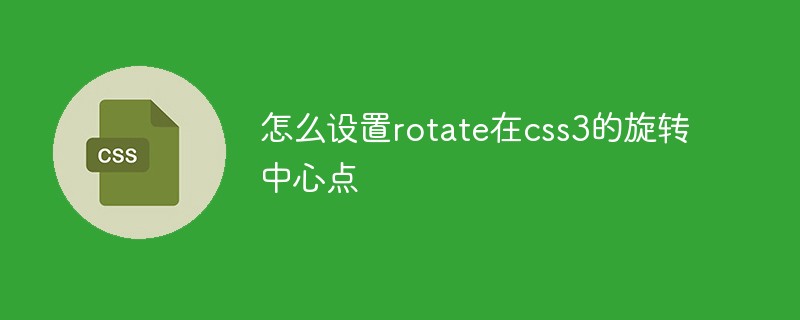 怎么设置rotate在css3的旋转中心点Apr 24, 2022 am 10:50 AM
怎么设置rotate在css3的旋转中心点Apr 24, 2022 am 10:50 AM在css3中,可以用“transform-origin”属性设置rotate的旋转中心点,该属性可更改转换元素的位置,第一个参数设置x轴的旋转位置,第二个参数设置y轴旋转位置,语法为“transform-origin:x轴位置 y轴位置”。


Hot AI Tools

Undresser.AI Undress
AI-powered app for creating realistic nude photos

AI Clothes Remover
Online AI tool for removing clothes from photos.

Undress AI Tool
Undress images for free

Clothoff.io
AI clothes remover

AI Hentai Generator
Generate AI Hentai for free.

Hot Article

Hot Tools

SublimeText3 English version
Recommended: Win version, supports code prompts!

SAP NetWeaver Server Adapter for Eclipse
Integrate Eclipse with SAP NetWeaver application server.

WebStorm Mac version
Useful JavaScript development tools

SublimeText3 Linux new version
SublimeText3 Linux latest version

MinGW - Minimalist GNU for Windows
This project is in the process of being migrated to osdn.net/projects/mingw, you can continue to follow us there. MinGW: A native Windows port of the GNU Compiler Collection (GCC), freely distributable import libraries and header files for building native Windows applications; includes extensions to the MSVC runtime to support C99 functionality. All MinGW software can run on 64-bit Windows platforms.





